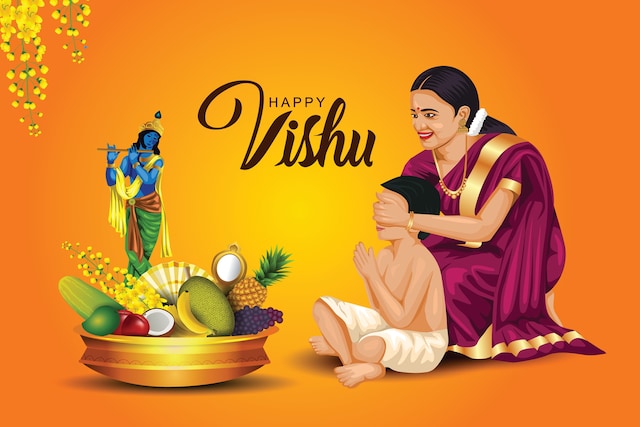Embracing Tradition: Celebrating Vishu with Joy and Renewal
Vishu is a vibrant and auspicious festival celebrated primarily in the South Indian state of Kerala and parts of Tamil Nadu. It marks the beginning of the traditional Malayalam New Year and usually falls in the month of April, typically on or around April 14th each year. The festival holds great significance in Malayali culture, symbolizing renewal, prosperity, and the joy of new beginnings.

The word “Vishu” is derived from the Sanskrit word “Vishuvam,” which means equal. It signifies the equinox and the equal length of day and night that occurs during this time of the year. Vishu is celebrated with much fervor and excitement, bringing families together in joyous gatherings and elaborate rituals.
The celebration of Vishu is steeped in ancient mythology and folklore, reflecting a rich tapestry of cultural and spiritual significance. One popular legend behind the celebration of Vishu is the story of Lord Krishna and the demon King Narakasura.
According to Hindu mythology, Narakasura was a powerful demon who had gained control over the heavens and the earth, causing havoc and tormenting the gods and humans alike. Unable to tolerate his tyranny any longer, the gods sought the help of Lord Krishna to vanquish Narakasura and restore peace.
In a fierce battle that ensued, Lord Krishna emerged victorious, slaying the demon Narakasura and freeing the world from his tyranny. The day of Narakasura’s defeat coincided with the onset of Vishu, marking the triumph of light over darkness and good over evil.
To celebrate this momentous occasion and the dawn of a new era of prosperity and righteousness, people rejoiced by lighting lamps, bursting fireworks, and adorning their homes with flowers and decorations. The tradition of setting up the Vishu Kani, with its symbolic representation of abundance and blessings, also originated from this legend, as a way to commemorate Lord Krishna’s victory and invoke divine blessings for the year ahead.
Another popular myth associated with Vishu revolves around the Hindu god Lord Vishnu, from whom the festival derives its name. According to this legend, on the day of Vishu, Lord Vishnu took on his Matsya (fish) avatar, symbolizing the beginning of creation and the cycle of life.
In Kerala, Vishu is also celebrated as the Malayalam New Year, marking the first day of the Malayalam calendar known as “Medam.” The agricultural significance of Vishu is evident in the abundance of seasonal produce such as fruits and vegetables that are harvested during this time, symbolizing prosperity and fertility.
Preparations for Vishu begin days in advance, with homes being cleaned and decorated to welcome the New Year with freshness and positivity. Intricately designed floral arrangements known as “Vishu Kani” are the centerpiece of the celebrations. These arrangements typically include items such as fresh fruits, vegetables, rice, gold coins, flowers, and a lit lamp, all arranged beautifully in a traditional brass vessel called “uruli.” The Vishu Kani is set up the night before Vishu, and it is the first sight that people behold upon waking up on Vishu morning. It is believed that seeing the Vishu Kani brings good luck and prosperity for the year ahead.
One of the most anticipated aspects of Vishu is the tradition of giving and receiving “Vishukkaineetam,” which are gifts of money given to children, family members, and friends as a symbol of blessings and good fortune. The exchange of Vishukkaineetam is a heartwarming gesture that strengthens bonds and fosters a sense of generosity and goodwill within the community.
Another highlight of Vishu is the sumptuous feast known as the “Vishu Sadya,” which features an elaborate spread of traditional Kerala dishes served on a banana leaf. The Vishu Sadya typically includes delicacies such as rice, sambar, avial, thoran, olan, pachadi, and various payasams (sweet desserts). Sharing the Vishu Sadya with loved ones is a cherished tradition that signifies unity, abundance, and the spirit of togetherness.
Vishu is also a time for indulging in various cultural activities and festivities. Traditional games, music, dance performances, and fireworks add to the celebratory atmosphere, filling the air with joy and merriment. Temples are adorned with colorful decorations, and special prayers and rituals are conducted to seek blessings from the divine for a prosperous year ahead.
Overall, Vishu is much more than just a festival; it is a celebration of life, hope, and gratitude. It reminds people to appreciate the beauty of nature, the importance of family and community, and the blessings bestowed upon them. Through its rich customs and traditions, Vishu continues to uphold the cultural heritage and values of Kerala, spreading happiness and positivity wherever it is celebrated.